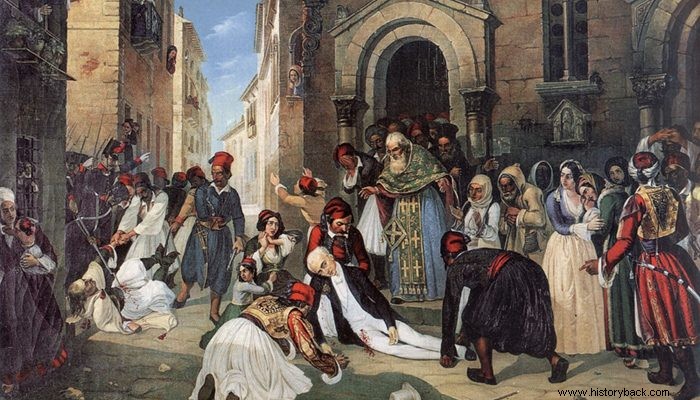
Ioannis Kapodistrias arrived in Greece on January 18, 1828. He had been elected governor of Greece by the Third National Assembly of Troizina, on March 30, 1827. However, Kapodistrias' election did not please either Britain or France, which suddenly saw the new state sliding into the arms of Russia, as they at least thought.
During his administration, Kapodistrias, due to the tragic financial situation of the state, tried to sign a loan with foreign banks, but he did not succeed due to the reactions of Britain. Russia and France then undertook to strengthen Greece financially by investing in influence in Greece, while the Tsar went further by donating 3,750,000 French francs to Greece. This move terrified the British, who thought they had Greece under control.
They believed that thanks to Kapodistrias Russia would gain access to the Mediterranean , which they had no intention of allowing. Thus, when a revolution broke out against Kapodistrias in Hydra and Poros, by Miaoulis and others of the English party, mainly, but also of the French, the British and the French excluded the revolutionaries, but did not move against them.
On the contrary, the Russians attacked the revolutionaries, thus causing even greater concerns to the British and French, who saw the increasing Russian influence, at the mercy of Kapodistria, in Greece. Finally the solution for them came with the murder of Kapodistrias by the Mavromichalians. In fact, even if in the end the Mavromiachalians killed Kapodistrias - a view that is disputed by some - the moral perpetrators of the murder were certainly not Greeks. After all, the geopolitical facts had changed dramatically after the defeat of Napoleon.
France was still a competitor of Britain, but the Russian threat in the Mediterranean was considered more important for the British, always in connection with the developments of the Eastern Question, of which the Greek Revolution was also an episode. From the time of the assassination of Kapodistrias onwards, the attitude of Britain and France towards the Ottoman Empire became more and more friendly. The Ottomans did not react to the conquest by France of Algeria, Tunisia and part of Morocco, which were basically possessions of the Ottoman Empire.
Also, the Ottomans allowed the strengthening of the Catholic Church, against the Orthodox, in the Holy Land, appeasing France - a fact that essentially caused the Crimean War. However, the testimony of Petrobeis Mavromichalis is indicative:"Curse the Anglo-French who were the cause of me losing my own people and the Nation losing a governor who will not be fooled. His blood chastises me to this day".
The decision of Ioannis Kapodistrias to proceed with the distribution of the National Lands to the poor fighters, seems to have been another point of friction between the Governor and the Greek dignitaries and foreign lenders , since the national lands were the only asset of the Greek state and therefore a guarantee for repayment of the onerous loans that had been granted to Greece!
Mani, completely controlled by Petrobeis Mavromichalis, had revolted against Kapodistrias and was preparing armed units. Kapodistrias arrested Petrobeus, but the situation was worsened by the revolt of Hydra. Under the leadership of the Kountouriotis family and the political guidance of Alexandros Mavrokordatos, the Hydraians rebelled, occupied the Poros naval station, and led by Andreas Miaoulis , set fire to ships of the fleet, among them the frigate "Hellas" .
It is also worth noting the attitude of Anastassios Polyzoidis, then editor of the newspaper "Apollon" and later one of the judges who refused to convict Kolokotronis in his eponymous trial. However, Polyzoidis was a fanatical opponent of the "tyrant" Kapodistrias and did not hesitate to preach even the "need to kill" him.
The encouragement of the rebels by the Great Powers, Britain and France, is historically proven. Petrobeis Mavromichalis was openly supported by the French Ambassador, while the Kountouriotis family and Alexandros Mavrokordatos were the genuine representatives of British interests. The assassination of Kapodistrias was ultimately organized by the French Rouen and the British Dawkins, who were carrying out instructions from their governments.
After all, they had previously attempted to kill Kapodistrias, through Mavrokordatus! Mavrokordatos had then paid 25,000 grosii to Kapodistrias' waiter, Nicoletto, to poison him. Although he initially accepted, he changed his mind and even informed Kapodistrias. When this attempt failed, riots broke out in Mani - with the assistance of French troops - and in Hydra.
On the day of the murder - September 27, 1831 - testimonies of the residents of Nafplio reported that an English boat was ready to sail, in the port of Nafplio, waiting for the boarding of some - apparently the murderers. But when no one boarded he left.
And the attitude of the French Ambassador Rouen, who after the murder gave asylum to Georgios Mavromichalis and refused to hand him over to the guard of Nafplio, Portuguese colonel of the cavalry Almeida, is a clear proof . Only when Almeida threatened to burn the embassy did the French ambassador hand over G. Mavromichalis. France, through their ambassador and military escort, did not stop defending the accused.
The military attache of France went so far as to threaten the Greek military judges who were trying Georgios Mavromichalis and his two constable accomplices not to dare to condemn them! The British ambassador threatened to sever diplomatic relations with Greece if the mobilizations of the people of Nafplio, who considered Britain jointly responsible for the Governor's death, did not stop. The testimony of the Russian ambassador Ribeaupierre is also revelatory, who wrote in his report on the murder:"...I have no doubt that the murderous hand was armed rather than England...".
